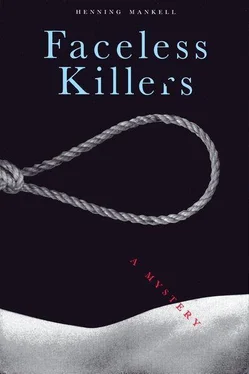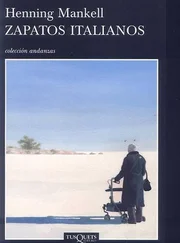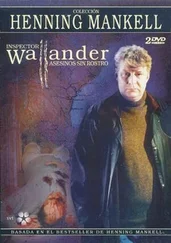“I’ll muck out later,” he said, stroking the horse’s mane.
“Why did they keep a horse?” Wallander wondered.
“To an old dairy farmer an empty stable is like a morgue,” replied Nyström. “The horse was company.”
Wallander thought that he might just as well start asking his questions here in the stable.
“You stayed up to keep watch last night,” he said. “You’re scared, and I can understand that. You must have thought to yourself: Why were they the ones who were attacked? You must have thought: Why them? Why not us?”
“They didn’t have any money,” said Nyström. “And nothing else that was especially valuable. Anyway, nothing was stolen. I told that to one of the policemen who were here yesterday. The only thing that might have been stolen was an old wall clock.”
“Might have been?”
“One of their daughters might have taken it. I can’t remember everything.”
“No money,” said Wallander. “And no enemies.”
A thought suddenly occurred to him.
“Do you keep any money in the house?” he asked. “Could it be that whoever did this got the wrong house?”
“Everything we have is in the bank,” replied Nyström. “And we don’t have any enemies either.”
They went back to the house and drank coffee. Wallander saw that the woman was red-eyed, as if she had been careful to cry while they were out in the stable.
“Have you noticed anything unusual recently?” he asked. “Anyone visiting the Lövgrens that you didn’t recognize?”
The old folks looked at each other and then shook their heads.
“When was the last time you talked to them?”
“We were over there for coffee the day before yesterday,” said Hanna. “Just like always. We drank coffee together every day. For over forty years.”
“Did they seem afraid of anything?” asked Wallander. “Worried?”
“Johannes had a cold,” said Hanna. “But otherwise everything was normal.”
It seemed hopeless. Wallander didn’t know what to ask them about. Each reply he got was like a new door slamming shut.
“Did they have any acquaintances who were foreigners?” he asked.
The man raised his eyebrows in surprise.
“Foreigners?”
“Anyone who wasn’t Swedish,” Wallander ventured.
“A few years ago there were some Danes camping on their field one midsummer.”
Wallander looked at the clock. Almost seven thirty. At eight he was supposed to meet Rydberg, and he didn’t want to be late.
“Try and think,” he said. “Anything you can come up with might be of some help.”
Nyström walked out to the car with him.
“I have a permit for the shotgun,” he said. “And I didn’t aim at you. I just wanted to scare you.”
“You did a good job of it,” replied Wallander. “But I think you ought to get some sleep tonight. Whoever did this isn’t coming back.”
“Would you be able to sleep?” asked Nyström. “Would you be able to sleep if your neighbors had been slaughtered like dumb animals?”
Since Wallander couldn’t think of a good answer, he said nothing.
“Thanks for the coffee,” he said, got in his car, and drove off.
This is all going to hell, he thought. Not a clue, nothing. Only Rydberg’s strange knot, and the word “foreign.” Two old people with no money under the bed, no antique furniture, are murdered in such a way that there seems to be something more than robbery behind it. A murder of hate or revenge.
There must be something, he thought. Something out of the ordinary about these two people.
If only the horse could talk!
There was something about that horse that made him uneasy. Something that was just a vague hunch. But he was too experienced a policeman to ignore his uneasiness. There was something about that horse.
At four minutes to eight he braked to a stop outside the police station in Ystad. The wind had died down to light gusts. Still, it felt a few degrees warmer today.
Just so we don’t get snow, he thought. He nodded to Ebba at the switchboard. “Did Rydberg show up yet?”
“He’s in his office,” replied Ebba. “They’ve all started calling already. TV, radio, and the papers. And the county police commissioner.”
“Stall them a while,” said Wallander. “I have to talk with Rydberg first.”
He hung up his jacket in his office before he went in to see Rydberg, whose office was a few doors down the hall. He knocked and heard a grunt in reply.
Rydberg was standing looking out the window when Wallander came in. It was obvious that he hadn’t had enough sleep.
“Hi,” said Wallander. “Shall I bring in some coffee?”
“Sure. But no sugar. I’ve cut it out.”
Wallander left to get two plastic mugs of coffee and then went back to Rydberg’s office.
Outside the door he suddenly stopped.
What’s my plan, anyway? he thought. Should we keep her last words from the press for so-called investigative reasons? Or should we release them? What exactly is my plan?
I don’t have any plan, he thought, annoyed, and pushed open the door with his foot.
Rydberg was sitting behind his desk combing his sparse hair. Wallander sank into a visitor’s easy chair with worn-out springs.
“You ought to get a new chair,” he said.
“There’s no money for it,” said Rydberg, putting away his comb in a desk drawer.
Wallander set his coffee cup on the floor beside his chair.
“I woke up so damned early this morning,” he said. “I drove out and talked with the Nyströms again. The old man was waiting in a bush and took a shot at me with a shotgun.”
Rydberg pointed at his cheek.
“Not from buckshot,” said Wallander. “I hit the deck. He claimed he had a permit for the gun. Who the hell knows?”
“Did they have anything new to say?”
“Not a thing. Nothing unusual. No money, nothing. Provided they’re not lying, of course.”
“Why would they be lying?”
“No, why would they?”
Rydberg took a slurp of coffee and made a face.
“Did you know that cops are unusually susceptible to stomach cancer?” he asked.
“I didn’t know that.”
“If it’s true, it’s because of all the bad coffee we drink.”
“But we solve our cases over our coffee mugs.”
“Like now?”
Wallander shook his head. “What do we really have to go on? Nothing.”
“You’re too impatient, Kurt.” Rydberg looked at him while he stroked his nose.
“You’ll have to excuse me if I seem like an old schoolteacher,” he went on. “But in this case I think we have to trust in patience.”
They went over the progress of the investigation again. The police technicians had taken fingerprints and were checking them against the national centralized records. Hanson was busy investigating the location of all known criminals with records of assault on old people, to find out whether they were in prison or had alibis. Questioning of the residents of Lenarp would continue, and maybe the questionnaire they sent out would produce something. Both Rydberg and Wallander knew that the police in Ystad carried out their work precisely and methodically. Sooner or later something would turn up. A trace, a clue. It was just a matter of waiting. Of working methodically and waiting.
“The motive,” Wallander persisted. “If the motive isn’t money. Or the rumor of money hidden away. Then what is it? The noose? You must have thought the same thing I did. This double murder has revenge or hate in it. Or both.”
“Let’s imagine a couple of suitably desperate robbers,” said Rydberg. “Let’s assume that they were convinced that Lövgren had money squirreled away. Let’s assume that they were sufficiently desperate and indifferent to human life. Then torture isn’t out of the question.”
Читать дальше












